By Erin Free
The director of the hard-edged Aussie cult classics Everynight…Everynight, Silent Partner, Tom White, Em 4 Jay and Blind Company, Melbourne-based Alkinos Tsilimidos changes course and heads into far sunnier territory with his new film, The Taverna. Set in a charming suburban Greek restaurant run by the ever harried but charismatic Kostas (wonderful Greek import Vangelis Mourikis), the film runs the course of one crazy night, where an errant belly dancer, drunken customers, and a roster of staff all with their own problems creates an atmosphere of boiling, but very funny, tension. Alkinos Tsilimidos talks about the creation of this sweet, tasty cinematic dish, and the perils of filmmaking in the age of COVID-19…
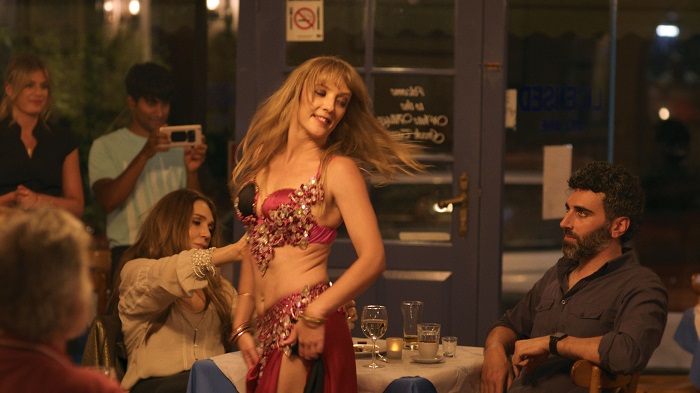
When I’m in Melbourne, I want to go to this restaurant! Please tell me that it’s a real place?
“It is, Erin! It’s White Village Tavern in Elsternwick. It’s my favourite Greek restaurant. Been in operation for about 25 years, and they still use salt!”
This is a lighter film for you…can you take us through your inspirations, and your goals for the film?
“I was inspired to make something light and fun. After Blind Company, I kind of hit a creative wall. I didn’t know my next move. I took some time out and ended up directing theatre and increased my teaching at universities and acting schools. I developed various film projects, but they didn’t see the light of day. I found myself leaning towards lighter material not for commercial reasons, but because I personally wanted to change my relationship to filmmaking. Even the thought of making a film was taxing on me – emotionally and physically. So, I was firstly inspired by the idea of having fun on set and then working on material that is essentially lighter but with real emotional stakes. Ultimately, the film itself was the goal, but now I hope it can entertain audiences and celebrate some local talent.”
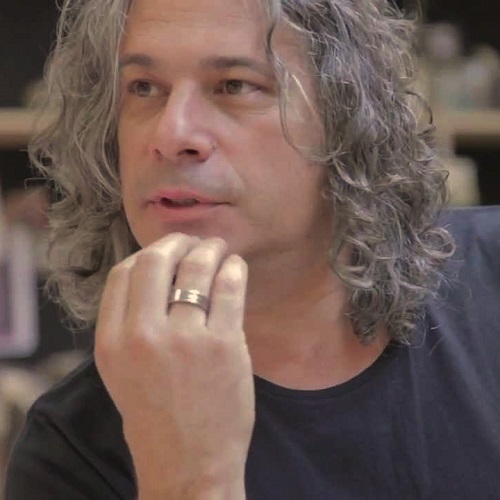
What was the writing process like? Was there much in the way of workshopping and impro?
“Once I realised the majority of the characters, the big revelation was to place them all inside a Greek restaurant and over one night. The character of Kostas came to me last! Which I suppose is curious. I was intending for the writing to come out of improvisation and workshopping with the cast, but because Vangelis was in Greece, it wasn’t possible to work that way. I think I just sat down and started writing, and the characters lead me through the story. After a few weeks, I came to the end. It was a fun process.”
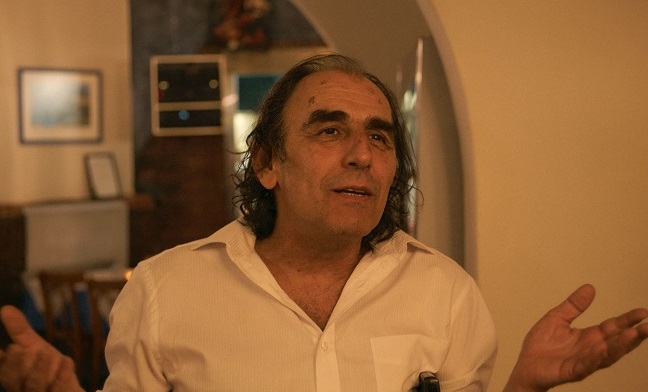
I loved Vangelis Mourikis in the film! He was wonderful…how did you grab the star of Chevalier for your film?
“It took thirty years! We’ve been friends for that long. We always entertained the idea of working together. I think maybe we were too worried about muddying up our friendship. We catch up usually once a year and mostly in Greece. I have watched his career go from aspiring actor to legend of Greek cinema. It’s always about timing. I think Vangelis also wanted to find something light, so when I pitched him the story, his response was, ‘When do we start?’ I remember the very first shot of the film, an exterior of the laneway. Vangelis was to drive towards camera and then pull into the back of the shop, get out of the car and unlock a gate. It happened and I called cut. We both looked at each other and smiled.”
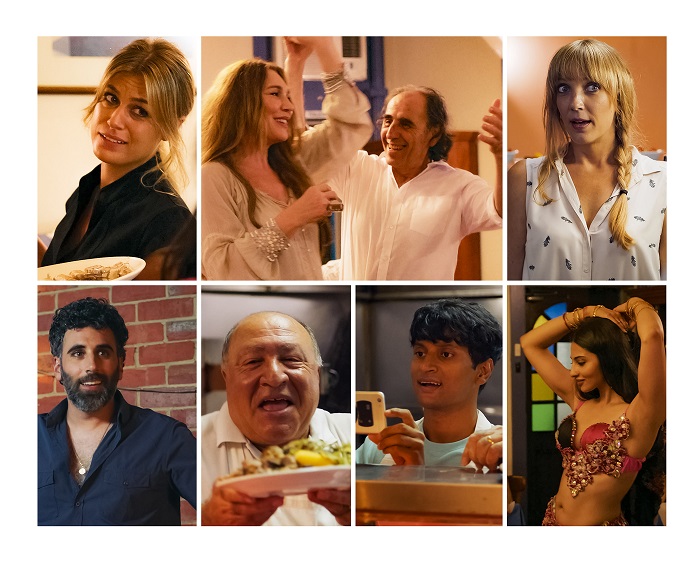
Your entire cast is great. They work brilliantly together, and really feel like the staff of a restaurant. Can you talk a little about your actors…how you cast them, rehearsals etc?
“I teach at 16th Street Actor’s Studio and a lot of the cast, I had either taught or I had come across over the years. Some I had even auditioned for other films. I was lucky because I had access to everyone except Vangelis, and they all wanted to rehearse. Vangelis was finishing another film and was in Greece, so we had to work via skype. We rehearsed for many, many weeks, which ended with the cast actually working in the restaurant for a few nights before we took it over for the shoot.”
There is such a rich history of films about food and restaurants…did you have any cinematic touchstones when you were making The Taverna?
“There are many which I have loved over the years: Big Night, and The Cook, The Thief, His Wife And Her Lover are standouts for me. As rehearsals developed, though, and as we got closer to the shoot, I think my love for The Maysles Brothers crept in. Their films have always been a source of inspiration for me. I wasn’t making a documentary, but I still wanted the kind of evocative and visceral human relationships that you can find in their movies.”
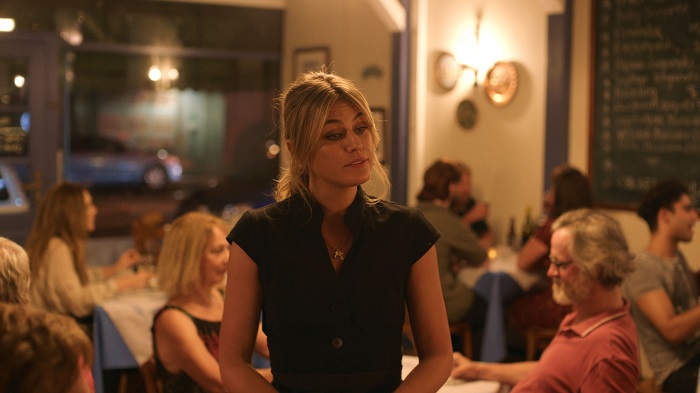
All of your films are obviously deeply personal, but this one feels particularly so…would you say that’s the case?
“Yes, absolutely. I’ve always believed that if your heart’s not in the film, then you shouldn’t even attempt to make it. Having a voice as a director means revealing something deeply personal about yourself. The Taverna came from reflections of my childhood, my affection for the underdog and the migrant story, and my love for Greek food and swearing.”
What was the shoot like? Can you talk a little about that?
“It was stinking hot. It was a Melbourne heat wave. We took over White Village Tavern and turned it into a movie set. I think it was the first time since its establishment that the restaurant was closed for business. We were there for sixteen days, and it was a hard but fun shoot. We had a tiny crew that worked incredibly efficiently. In fact, Vangelis was genuinely amazed because no-one was yelling at each other; normally on Greek shoots, he tells me that there’s more drama behind the camera than in front.”
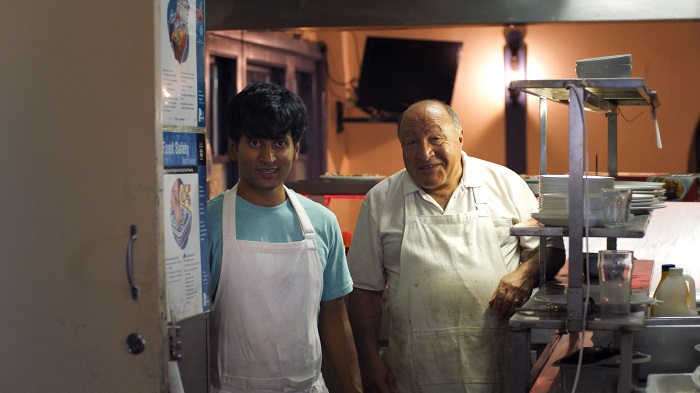
What was the most difficult aspect of creating The Taverna? And the most pleasant surprise?
“I hadn’t made a film for ten years. That’s a long time to be out of the game. During the first week of the shoot, there was a moment when I lost my nerve. The weight of a schedule, the crippling budget, long daylight hours and making decisions on the run. It all felt overwhelming. I took a short walk and remembered that you’re always up against it as a director. From that moment, I decided to just enjoy the chaos. The most pleasant surprise came about eight months later when the film closed The Greek Film Festival. I heard the audience laugh. They were laughing at the gags.”
Was filming/release affected at all by COVID-19? And how does it feel to be one of (if not the) first Aussie films to be back in cinemas?
“The film was shot in the summer of 2019, so thankfully we missed COVID-19, but then it caused the postponement of the release in April this year. There’s still lots of uncertainty around restrictions in Victoria, and if people want to go back into the cinemas at this stage. It’s always difficult releasing an Australian film under most circumstances, but this is unprecedented. It’s going to be interesting. I can’t help but feel a little like a lamb wandering into a Greek BBQ.”
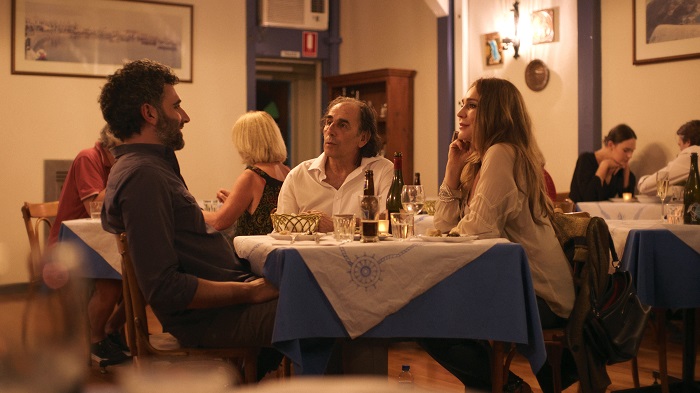
What’s coming up next for you? Is it even possible to work/plan etc in this current environment?
“During the lockdown, I was able to write a new screenplay. It’s about two women who put their luck to the test after stealing a pair of shoes. It was originally intended as a feature film, but there’s so much uncertainty around cinemas, and financing features has virtually become an impossibility. Thankfully, there’s some interest in developing the script into a TV series. I hope to start writing again this month.”
The Taverna is released in cinemas on July 2. Click here to read our review of the film. For more on 16th Street Actors Studio, click here.



This film is so thick with foul language that sitting through almost every sentence with the F word is intolerable.
Be warned!
Wow, it was realistic and funny. Generally, imposed a good sense of humour being what the Greeks are good at from the word “philotimo“ . Good hard working people with big hearts.
Loved the film and so refreshing to see stories about Multicultural Australia. Well Done and OPA! 10/10